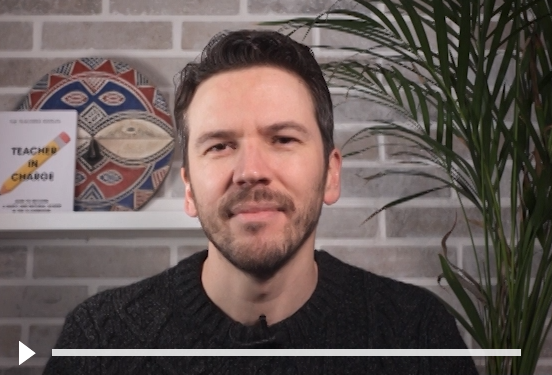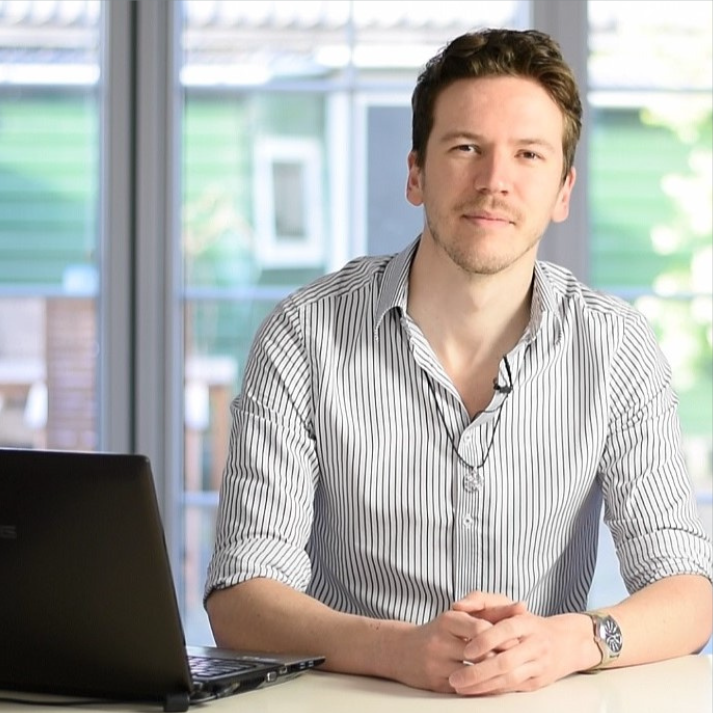
With the RIGHT TOOLS, classroom management is EASIER than you think

You might be familiar with the following problem. Your students misbehave, but you cannot act decisively, because you have NO IDEA WHAT TO DO. I'm here to tell you this is not your fault. It just means that you need A PLAN.
That is what I will offer you in my FREE MINI-COURSE. In three videos, you will learn the following:
| ✔ |
Become a relaxed and happy teacher that has plenty of energy left at the end of the day. |
| ✔ |
Get known as among colleagues and students as a teacher who is both friendly and in control of his class. |
| ✔ |
Learn the tools to get a class quiet automatically, without saying a word (you will not learn this anywhere else!) |
| ✔ |
Never get interrupted or get dragged into pointless arguments with students |
| ✔ |
Get your class on your side and finally get the space to teach in your own preferred personal style |
Get immediate access to your first lesson by filling in your details below. You will receive the other two videos in the coming days in your mailbox. So sign up now!

What you will learn in my in depth four-part mini course?
Video 1:
Almost all teachers in the modern West struggle with the same problems that make an otherwise wonderful job extremely tiresome. In this video, I will go through my diagnosis that modern teachers enter their class without a PLAN to deal with misbehaving students. All we usually resort to is asking students to stop their negative behavior, over and over again without effect. I will also bring you on my journey to figure out how to deal with this.
Video 2:
In this video, I will explain in detail what to do when we have to intervene. I have developed an intervention that is at once powerful and also positive, pro-active, and in line with modern sensibilities. This intervention can be applied mostly non-verbally, allowing you to continue teaching without interruption. It is also immediate effective and it uses powerful lessons from behavioral psychology to effectively nudge students towards de-escalation.
Video 3:
This video is where the magic happens. I will tell you how my system works when you get good at it. In many tough classes I've spend about 15-20 minutes in total on classroom management during the entire school year and without having to raise my voice. Meanwhile, my students loved my lessons and I could teach in my usual relaxed, happy-go-lucky style. In this video, I will also discuss how you can best apply the material when you are first starting out. In this video, I will also discuss where you can get additional information, to get this problem solved once and for all.
Watch the first video immediately by filling in your details below. You will receive two more videos in your mail in the comming days. It's completely FREE:
What teachers say about my course
The consensus is that most people can learn classroom management. Obviously, it will get easier with experience.
I thought I was too friendly for this tough class, but it turns out I don't have to sacrifice the friendly part of myself and become a miss terror. I can be friendly and at the same time very clear. And in this way students also get what they want, namely, a relax and calm class, where they can concentrate and learning something.
I was looking for a method that would costs me less effort and that would frustrate me less. So, instead of warning ninety times in one lesson, I now use a much more compact system. It is much clearer to my students and my class is much calmer. The idea to only warn a once, that sounded like a utopia to me. It was very desirable for this group.
I find it much better to be friendly than to continuously act like a police officer writing out fines. Instead, I can just use a small gesture or a small sign to make clear: "This is my limit. It stops now." And I can do my own thing during the rest of the lesson.
- A colleague from Amsterdam
I noticed I was fighting a lot with my students and I didn't want that at all. I looked at other teachers and some of them were very strict, but I couldn't recognize myself in that either. I knew that if I wanted to continue teaching, my lessons should go the way I want to. There has to be order in class, but I also should be able to be myself and be there for my students, for that is the reason I became a teacher. And that just wasn't possible before.
Before, students did not want to listen to me. I had no authority. And the students weren't at all as friendly to me as I was to them. That was what I was up against. I then got some tools from this course from which I picked the things that fitted best with my character and learning style. What I learned most of all is that I shouldn't keep correcting students without repercussions. And I also noticed that students are very receptive when they know there is some kind of consequence, for instance the essay introduced in the course. That has way more effect than detention or any other measure. The effect is very large and it is also positive, because the essay also invites a conversation.
The greatest plus is that I can just be myself. I feel very comfortable with that. I am also greeted more often in the hallway and students give me compliments instead of only the other way around. I notice that if I correct students, they are much more receptive for a conversation instead of immediately reacting defensively. I no longer battle with my students.
- Another colleague from Amsterdam
About me
Hey! I'm Stephan P. Dinkgreve. I have a master in theoretical physics from the University of Amsterdam and I teach high-school physics near Amsterdam.
At university, I found out I had a knack for explaining complex matter in a clear way. As a result, I went into education. Fed up with the physics books in use, I wrote my own physics textbooks that have been used by thousands of students in the Netherlands.
I soon figured out teaching is more than just explaining things clearly. I found out I needed to learn groups dynamics too, without which my classes turned to chaos. I began reading literature on classroom management from all over the world, but I found little of use. I picked up some useful tips, but nothing powerful. But then I discovered the work of the educational expert Astrid Boon, who demonstrated she could immediately and permanently halt negative behavior—and most curiously, was often thanked by the misbehaving students afterward. Luckily, she was willing to discuss the matter, give me some tips, and even observed one of my lessons.
Before I knew it, my results were spectacular. I could change around tough classes truly in a matter of seconds and without raising my voice. With the negative behavior out of the way I had lots of quality time to get the class excited about physics—the reason I got into education in the first place.
Her system, however, still had a downside. It felt a bit old-fashioned, which made it sometimes hard to explain to parents and colleagues. To solve this problem, I developed a
positive, pro-active version in line with modern sensibilities. The result is the system you have read about on this page. If you want to know more about it, you can subscribe to my FREE mini-course below.
Kind regards,
Stephan P. Dinkgreve
MSc. Theoretical Physics

Common problems with classroom management and how to repair them
I remember, during my first years teaching, when my classes where in complete chaos, how helpful it was to hear the problems I was facing were common and solvable. Below I will go through the list.
What is classroom management?
Classroom management is about giving structure to your classes, so that true learning can take place and both the students and the teacher feel safe and comfortable. If classroom management is not in order, a whole range of problems can occur.
Causes
If we teach without clear boundaries and when we do not have a plan when these boundaries are crossed, some students will start to test their teacher to see what they can get away with. When it becomes clear to the class that you lack boundaries, more students will join in. Before you know it, the students are talking whenever they please and your lessons are ruined.
Common problems
From here a whole range of problems form, some having to do with the functioning of your class and others with your own physical and emotional well-being. I will start with the former:
- The teacher gets interrupted on a regular basis, sometimes hundreds of times a day. Asking the students to stop does not help. Getting angry sometimes helps, but only for a short while and costs a lot of energy.
- I have to strain my voice or yell to get heard, because I have to talk over the students.
- Some students are incredibly rude and disrespectful. They start senseless arguments and seem to assume I have bad intentions.
- Students show no interest in my lessons. I prepare good lessons, but never get to executing them.
- I continuously have to police the class. I constantly have to correct students and they seem to resist my every move.
- Students try to get under my skin. They play games with me, trying to knock me off balance. The more I try to control the situation, the more they try to take me down.
- During seatwork, many students do not even start and instead immediately start talking. I can get the class quiet down, but the moment I release pressure, the class immediately explodes back into chaos.
- Students throw objects through my class the moment I face the white board.
- Some students walk through class when they are not supposed to
- Some students play games, text each other, and even make videos on their phones.
- Some students push each other or even start fights or take each other's belongings.
- Students do not bring their materials with them and do not do their homework.
- Students refuse to sit in their designated seat.
- Students litter my classroom and draw on their desks.
Persistent problems with classroom management can also cause physical and mental health issues.
- Some teachers develop a sore throat or even lose their voice from continuously talking over their students or even yelling to get attention.
- Some teachers built up of unhealthy stress that can cause (when experienced over a prolonged time) all kinds of negative health consequences. Especially the burnout rate among teachers is extremely high.
- Many teachers experience having abnormally low energy at the end of the day. They often need to take long naps after work or will go to sleep extremely early, disrupting their personal, family, and social life.
- Some teachers experience feelings of hopelessness, inadequacy, and even anger because of persistent classroom management problems.
How to repair these problems?
Luckily, there is a path out of this. Fill in your details below and receive three free lessons:
Some common questions and answers
Can anyone learn classroom management?
The consensus is that most people can learn classroom management. Obviously, it will get easier with experience.
How long does it take to learn classroom management?
Most teachers get some initial results already in their first weeks they actually apply the system. Teachers often have initial results in the easier classes (which is already a great win), while there are more ups and downs with the tougher classes. Over the weeks, the ups become more frequent. It might take a few years to get really good at it.
When is it best to start?
You will have the easiest time if you start at the beginning of the year. However, I advise starting as soon as you can, because chances are that your first introduction of the system is not the most effective one. If you've found this website mid-year, start immediately, so that you gain the necessary experience to start fully prepared during the next school year.
Is it complicated to execute the system?
Not at all! It takes some time to learn, but once you've mastered the skill, it takes little effort. In fact, the system automatically solves a lot of problems that you would otherwise have to deal with. In many tough classes I've spent only 15-20 minutes on classroom management in an entire school year.
Does it require much energy to learn the system?
At first, it takes quite a bit of energy, usually even more than you are used to. But not long after it will take far less energy. Once you understand group dynamics, you can change a class with almost no effort and with a smile on your face. This takes some practice, but it is well worth it.
Does the system require that I become an authoritarian rule-obsessed teacher?
Not at all! Of course, you will have to intervene when students misbehave, but the whole point of the system is the prevent interruptions from occurring in the first place. As a result, it greatly reduces the time you are dealing with negative behavior and correcting students.
Can I still be myself using the system?
Because the system prevents interruptions from occurring in the first place, it gives you more space, not less, to be yourself and to teach in your preferred style.
Does it require some special charisma or talent to pull of the system?
No, it does it. Of course, it doesn't hurt if you have a powerful presence, but what is more important is consistency. You need to learn to follow through on your promises. As long as you do this, I have made the system work even when I felt weak and low on energy. Luckily, consistency is a learnable skill, and also a skill useful in many other areas of your life.
How can I learn more?
A good first step is to subscribe to my FREE mini-course:
© 2024, Stephan P. Dinkgreve
The Teaching Manual
teachingmanual.com
The advice and information provided in this teaching manual is for informational purposes only. The user of this material assumes full responsibility for the use of the information contained herein and understands that any implementation of the information provided is done at their own risk. The author shall not be liable for consequences of any kind arising from reliance on the information contained in this teaching material.



